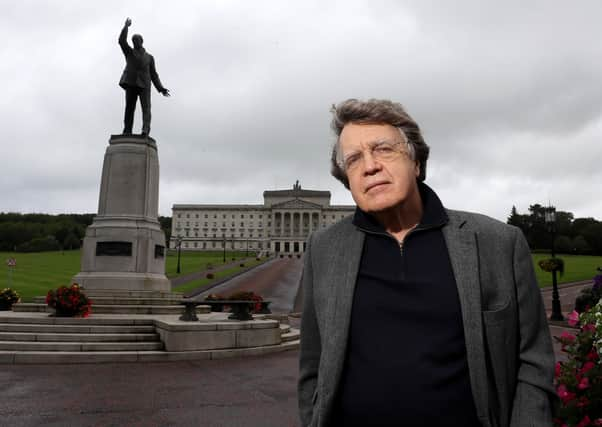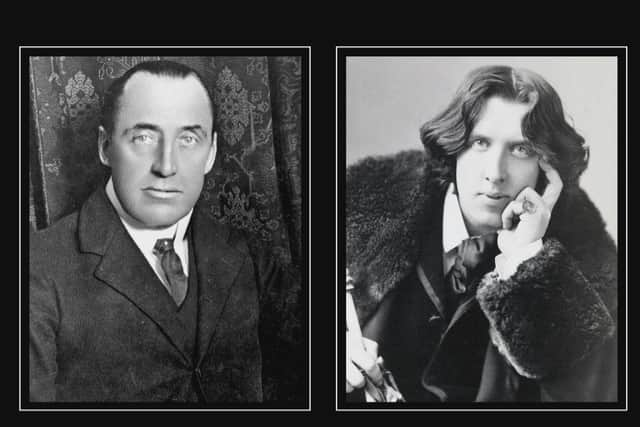Oscar Wilde’s grandson explores Carson courtroom confrontation in new BBC One Northern Ireland documentary


Oscar Wilde, the Dublin-born author, aesthete and wit is fondly remembered for his many plays, including comic masterpieces The Importance of Being Earnest and Lady Windemere’s Fan.
The larger-than-life figure also achieved notoriety when he was put on trial for gross indecency after the details of his homosexual affair with a British aristocrat, Lord Alfred Douglas, were made public
Advertisement
Hide AdAdvertisement
Hide AdIn a new BBC One Northern Ireland documentary, ‘Edward Carson And The Fall of Oscar Wilde’, Merlin Holland, Oscar Wilde’s only grandchild, examines what was the most scandalous court case of Victorian times, and one which led to his fabled forebear’s imprisonment and ruin.


In 1895 Edward Carson, who is remembered as the greatest leader of Unionism and as the ‘Father of Northern Ireland’, and was also renowned as the most brilliant lawyer of his generation, was engaged by the Marquess of Queensberry to lead his defence against Oscar Wilde’s action for criminal libel.
Speaking from his home in France, Merlin Holland, 74, believes many people will not know of Edward Carson’s involvement in the trial of Oscar Wilde, the man whom he endearingly calls his ‘grandpa’.
“If you ask the average person who had cross-examined Oscar in court, they wouldn’t be able to tell you. And yet, Edward Carson is an enormous figure in Northern Ireland - everyone knows who he was.”
Advertisement
Hide AdAdvertisement
Hide AdThe Marquess of Queensbury, angry at Wilde’s ongoing homosexual relationship with his son, Lord Alfred Douglas, (Bosie) had left his calling card at Wilde’s club with an inscription accusing Wilde of being a “posing somdomite” [sic].
Wilde retaliated with a libel action, as homosexuality was, at the time, illegal.
Carson portrayed the playwright as a morally depraved hedonist who seduced naïve young men into a life of homosexuality with lavish gifts and promises of a glamorous artistic lifestyle.
He impugned Wilde’s works as morally repugnant and designed to corrupt the upbringing of the youth.
Advertisement
Hide AdAdvertisement
Hide AdQueensberry spent a large amount of money on private detectives who investigated Wilde’s activity in the London underworld of homosexual clubs and procurers.
Wilde abandoned the case when Carson announced in his opening speech for the defence that he planned to call several male prostitutes who would testify that they had had sex with Wilde, which would have rendered the libel charge unsupportable as the accusation would have been proven true.
Wilde was bankrupted when he was then ordered to pay the considerable legal and detective bills Queensberry had incurred in his defence.
Based on the evidence of Queensberry’s detectives and Carson’s cross-examinations of Wilde at the trial, Wilde was subsequently prosecuted for gross indecency in a second trial. He was eventually found guilty and sentenced to two years’ hard labour, after which he moved to France, where, in 1900, he died penniless at the age of 46.
Does Holland harbour any hard feelings towards Carson?
Advertisement
Hide AdAdvertisement
Hide Ad“No, absolutely not. As Oscar Wilde said ‘Nobody could destroy a man like me, except myself’.
“People have a better claim to have destroyed Oscar than Edward Carson.
“He (Carson) apparently said to his wife, ‘I’ve destroyed the most brilliant man in London’.
“I think there was a humane side to him (Carson), who felt that here was a man who was quite different to him, but he was doing a job. He was paid to do a job and it was going to further his career.
Advertisement
Hide AdAdvertisement
Hide Ad“I admire him for what he did, not to my grandfather, but for what he did as a lawyer.”
Oscar Wilde and two sons with his wife Constance Lloyd, Cyril (1885-1915) and Vyvyan (1886-1967) - Merlin’s father.
What many people may also not know, and what is revealed in the documentary, is that Carson and Wilde were friends in childhood.
Both born in Dublin, they met as children playing in the summer along the seashore at Dungarvan, County Waterford.
Advertisement
Hide AdAdvertisement
Hide AdThey also knew each other when they were students at Trinity College, Dublin.
Producer Damon Quinn from the Hole in the Wall Gang who made the film for BBC Northern Ireland, described the documentary, which was filmed at various locations, including Belfast, Dublin and Paris, as a “personal and unique insight into the story of Wilde and Carson told by Wilde’s direct descendant.”
“After we met Merlin for the first time, we were absolutely convinced that we wanted to centre the programme around him, because it had never been done before. I think that’s what makes the programme so rich,” he said.
“I was also driven by the fact that no one knew the whole Carson story. I was always fascinated by it and in this part of the world we all know who Edward Carson is, the ‘father of Northern Ireland’, whether you agree with him or whether you don’t.”
Advertisement
Hide AdAdvertisement
Hide AdMr Quinn added: “From my background as a lawyer I was always fascinated by the trial and by the fact that he had this connection to Oscar Wilde.
“A lot of people don’t know the story, a lot of people know a bit of the story and some say ‘Edward Carson prosecuted Oscar Wilde’, when in fact he didn’t - he defended Queensberry in the libel action, which is an entirely different thing.
“Merlin was also able to bring a lot of his friends to the film, including such people as Simon Callow, Rupert Everett and Giles Brandreth, who are all huge Oscar enthusiasts. I think it tells the story in a way that couldn’t have been told otherwise.”
Mr Holland added: “They (Rupert Everett, et al) were able to be absolutely frank about what they felt about him.
Advertisement
Hide AdAdvertisement
Hide Ad“In the documentary Rupert Everett says Oscar was “intoxicated with fame and success”. Oscar had lost the plot. It was a very balanced view, rather than a very hagiographic view of Oscar Wilde, and that’s what I liked about it. It presented him with his faults, of which there were plenty, so it was a very balanced picture I think.
“I enjoyed making it more than any other documentary that I’ve done.”
There are many moving moments in the documentary, not least when in Paris, when Mr Holland sees, for the first time, the document detailing Wilde’s conversion to Catholicism on his deathbed.
“It was the remembrance that the people who could have been there (at his deathbed), his two children, weren’t. And it got to me instead.”
Advertisement
Hide AdAdvertisement
Hide AdDamon Quinn added that finding that document was down to happy coincidence.
“It came about because our director’s brother is a Passionist priest, the same order as the priest who gave Oscar the last rites. He is based in Paris and when he heard that we were doing this film he contacted us and said they had the record in the book of Oscar Wilde’s conversion.
“When Merlin sees that in the film, he’s seeing it for the very first time.
“Merlin always says he loves to find out new things and that was one of the things we were very pleased about, that we were able to bring something new to the film, which was this document we didn’t know existed.”
Advertisement
Hide AdAdvertisement
Hide AdMr Holland, who has written books on his famous grandfather, including the Irish Peacock and Scarlet Marquess, the definitive account of the libel trial, said being the grandson of Oscar Wilde hasn’t been an easy role.
“It’s the burden of other people’s expectation.
“You almost feel there is a pressure on you to perform... not quite, but something like that. From that point of view, it hasn’t been easy. I try to get out of the shadow as much as possible.
“On the other hand it has had enormous advantages, including meeting and keeping in touch with people like those who have been in the film. It’s brought me some wonderful acquaintances and wonderful friendships.
“Oscar is such an enormous personality that I always hesitate to either claim that I may feel him or that I may have the tiniest bit of him hard wired into me in some form or other genetically, as I suppose one does, even at two generations removed.”
*Edward Carson And The Fall of Oscar Wilde on BBC One Northern Ireland, Monday 1 February at 10.45pm,
Comment Guidelines
National World encourages reader discussion on our stories. User feedback, insights and back-and-forth exchanges add a rich layer of context to reporting. Please review our Community Guidelines before commenting.